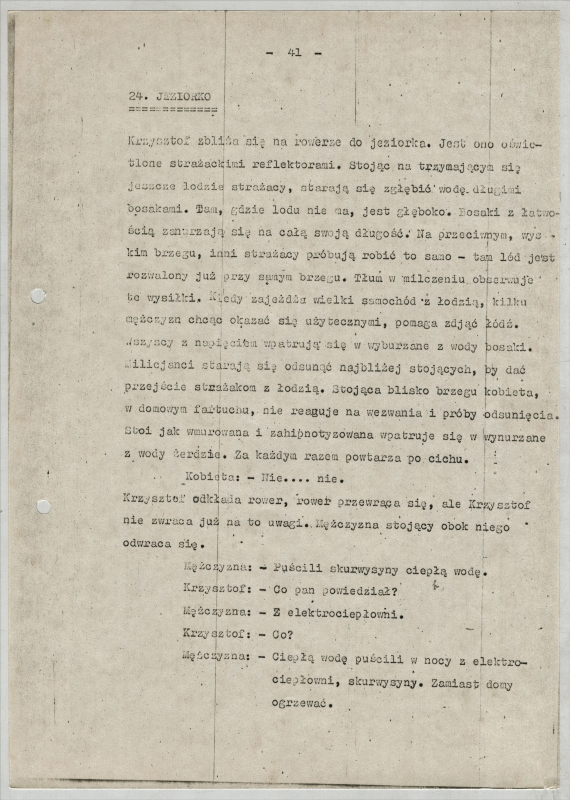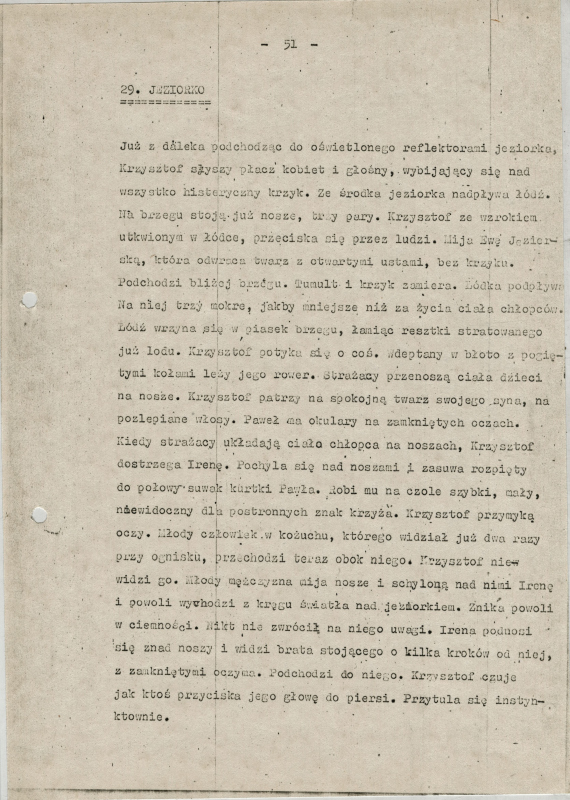Lake in Gocław
This body of water was artificially created in 1935 by damming up the Wystawowy (Exhibition) Canal. It is located between the neighborhoods of Gocław and Saska Kępa, in what is likely a former channel of the Vistula river.
Decalogue One
The lake is the location of the central and most dramatic event of the first episode. On a cold winter’s afternoon, several boys from the nearby apartment buildings, including the teenage boy Paweł (Wojciech Klata), fall through the ice and drown. Krzysztof (Henryk Baranowski) watches as scuba divers retrieve his son’s lifeless body from the ice waters. The father’s stable, predictable, “calculable” world suddenly comes crashing down. This event, featured on the first pages of the Decalogue screenplay, was inspired by Krzysztof Piesiewicz, who endured a nerve-racking winter afternoon in the early 1980s when his son was late coming home from the skating rink set up on the neighborhood pond. It was an emotional evening, one that left an indelible mark in his memory: the image of a father waiting for his son, as the family began praying for the boy’s safe return. The role of the father was played by Henryk Baranowski, a theater director and friend of Kieślowski’s. The director of The Decalogue considered performing the part himself at first, but after shooting a few test scenes and consulting with the film crew, he abandoned the idea. Another boy was initially chosen for the role of Paweł, but the director recast the part after a few days, dissatisfied with the boy’s performance on screen. The young actor was replaced by Wojtek Klata, and the Kieślowski reshot the scenes with the new cast member.
Mikołaj Jazdon
“Hidden signs” (1)
The Decalogue is God’s ten words to Man. It is more an appeal than a invocation or proscription. “What is man that you are mindful of him?”, asks the psalmist.
In Decalogue One, everyone—the audience and filmmakers—reach a boundary and find themselves standing before a dark gate. The boundary of what? A gate leading whither? God appears in this film as a silent Darkness. The “strange god”—the computer—is a much more powerful presence. It does not share in the characters’ misfortune, blinking at the devastated father, I am ready…, as if it knew nothing. And no wonder: “strange gods,” after all, are dead. And the living God, as the Scriptures say, “dwells in darkness.” Does this film deal with punishment? No. It tells of man’s bonds to the Mystery. Does Moses’ Decalogue only deal with our moral duties? Again, no. The “Divine Words,” especially the first ones, are a call for interaction. A call from the darkness.
For reasons unknown, a Man wearing a sheepskin coat appears in the first scene at the lake, and when the events reach their tragic conclusion, he walks away. It is apparent that he comes from a different world, in a sense. He doesn’t appear to live here… He seems to know something, but is involved in nothing. (A stunning performance by Artur Barciś!) He sits indifferently on the opposite shore. He resembles the “doorkeeper before the law” in Franz Kafka’s The Trial. He is here for the Boy, and looks at no one but him. He guards the sign: a beloved dead dog. When the Boy falls through the ice into the black abyss of the lake, he walks away. The end.

